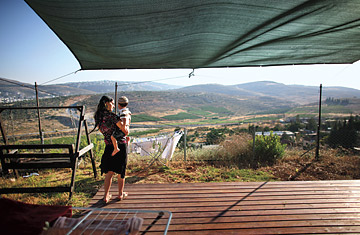
Jewish settler Einat a Bloch holds her neighbours son outside their home at the settlement of Shilo in the West Bank.
In a hilltop suburb South of Jerusalem called Efrat, Sharon Katz serves a neat plate of sliced cake inside her five-bedroom house, surrounded by pomegranate, olive and citrus trees that she planted herself. She glances out the window at the hills where, she believes, David and Abraham once walked. "We are living in the biblical heartland," she sighs.
It is a heartland the prophets would not recognize, replete as it is with pizza parlor, jazz nights at the coffee shop, grocery store and yellow electronic gate with machine-gun-wielding guards. Efrat is one of 17 settlements that make up a bloc called Gush Etzion, located not in Israel but in the occupied West Bank. The Katzes (Sharon, husband Israel and five children) consider themselves law-abiding citizens. They publish a small community magazine and take part in civic projects. Sharon raises money for charity by putting on tap-dancing and theater shows. And yet to much of the outside world, the Katzes are participating in an illegal land grab forbidden by the Geneva Conventions, which prohibit an occupying power from settling its own civilians on militarily controlled land. Some Israelis have admitted as much. While Benjamin Netanyahu, then as now Prime Minister, was negotiating with Palestinian leader Yasser Arafat in 1998, Foreign Minister Ariel Sharon got on Israeli radio and urged Israelis to settle more land fast. "Grab the hilltops, and stake your claim," he said. "Everything we don't grab will go to them."
The Palestinians ("them") hate the settlements as a reminder of occupation, proof that if and when any agreement with Israel is forged, they will never get back the land they call theirs. The settlements have joined other intractable issues — like the desire of Palestinian refugees to return to villages their families left 60 years ago — that have stymied every effort to find peace in the Middle East for a generation. The Obama Administration says negotiations between the Palestinians and the Israelis can only proceed if Israel agrees to stop settling occupied land. "The settlements have to be stopped in order for us to move forward," said Barack Obama when he met with Netanyahu in May. But for Israeli politicians on both the left and the right, even agreeing to freeze the settlements — much less dismantling them — is easier said than done. And the Katzes are one of the reasons why.
It wasn't always so. After the Six-Day War in 1967, two groups of then rare (now commonplace) religious nationalists settled one small site each in the Galilee and Efrat. At the time, the Israeli government had no intention of settling seized Arab land and sheepishly described the settlements as military bases. Over the years, though, Israeli governments of all political persuasions have supported colonizing the West Bank — providing money, building permits and water and sewage services, as well as constructing special settlers-only roads. The number of settlers has grown fast in the past 15 years, as Israeli troops have pulled out of Arab cities and moved into the countryside, where they protect the Jewish population centers. In 1995, according to Israeli census figures, 138,000 settlers lived in the West Bank and Gaza. Now in the West Bank alone (no settlers remain in Gaza), there are nearly 300,000, mostly nestled together in heavily guarded blocs, living among 2.5 million unwelcoming Arabs. An additional 200,000 Israelis live in East Jerusalem, which Israel "annexed" in 1967.
A Gathering of the Exiles
Over the years, the Israeli government has paid lip service to the idea of opposing settlements, mainly by evacuating small outposts while supporting the large, suburban-style blocs. In 2005, Israel turned Gaza over to Palestinian control, ceding major settlements for the first time in 30 years. For the settlers, who frequently justify their presence as sanctioned by God, that act was a benchmark provocation and — in the view of religious nationalists — a divine repudiation of Israel's failure to settle yet more land. The government compensated each of the Gaza families with up to $400,000, but the money is of little interest to Sharon Katz and others in Efrat. They intend to stay put.
